June 18, 2025 | 11:17 GMT +7
June 18, 2025 | 11:17 GMT +7
Hotline: 0913.378.918
June 18, 2025 | 11:17 GMT +7
Hotline: 0913.378.918
As one of the coffee gardens supported by Project VnSAT with loans for replanting, Mr. Nguyen Huu Dinh (living in Nam Binh commune, Dak Song district, Dak Nong province, a member of the Doan Ket Agricultural Cooperative) borrowed capital for replanting on the old coffee area.
Mr. Dinh's family possessed over 3 ha of coffee planted since 1996. Mr. Dinh's coffee garden is old and the previous varieties planted only produce small fruit.
Mr. Dinh was supported by Project VnSAT with 555 seedlings and a reciprocal loan to replant 5 sao of coffee. After 4 years of replanting, this coffee garden has begun to provide Mr. Dinh's family with a stable income.
“The coffee variety sponsored by Project VnSAT produces large and similar fruits, with better quality than the old variety. In terms of productivity, due to the area of re-cultivated coffee being still new, it can not be fully evaluated yet. However, the trees grew healthy and the number of fruits in the after season is more than the previous one.
If I keep to the old-fashioned way, not participating in Project VnSAT, my family's 5 sao of farming will not be as it is currently. In the commune, there are a few families replanting at the same time as my family, but they do it the old-fashioned way, so the rate of tree death is very high. When the tree dies, they purchase seedlings to replant, the whole garden looks undulating with big trees and small trees”, Mr. Dinh shared.
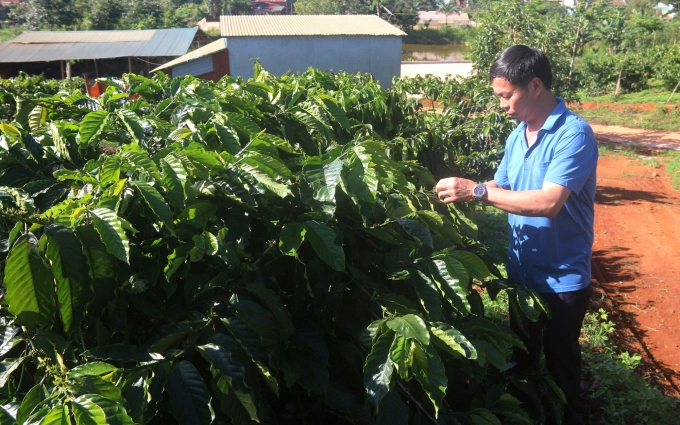
The replanting garden of Mr. Luu Nhu Binh's family is lively and presents a high yield after replanting. Photo: Minh Quy.
According to Mr. Dinh, thanks to careful soil improvement and proper application of techniques, diseases were under control and the trees thrived. The soil is carefully improved, resulting in high porosity and numerous microorganisms.
“The garden thrives and is superior to other gardens, people in the area often arrive and ask about the caring process. Many farmers who saw the good seeds also asked about shoots to improve grafting. For the people wanting to learn from experience, I took the knowledge learned from the training programs of Project VnSAT and passed it on to them. For families who have learned from my experience are not satisfied, I came to the garden to both guide and help them", Mr. Dinh added.
Mr. Luu Nhu Binh, Director of Doan Ket Agricultural Cooperative shared that the cooperative was established in 2014 with more than 50 members, covering an area of over 200 ha. By 2017, the cooperative had access to Project VnSAT through referrals. Participating in the project, cooperative members are supported with scientific and technical training on coffee caring and coffee replanting in a sustainable way.
According to Mr. Binh, Project VnSAT also supports the cooperative with 3 sustainable coffee replanting models with an area of 1.5 ha. In addition, the project also cooperates with Dak Nong Agricultural Extension Center to teach replanting techniques and coffee care techniques.
“Old coffee gardens suffered reduced productivity from 5 tons to 2.5 tons/ha. After being supported by the project, the cooperative chose 3 enthusiastic members and suitable lands to support coffee replanting. After replanting, 3 years later the coffee garden became very lively again. Replanting allows the coffee garden to rest for 3 years and then gives a stable harvest, superior compared to that of an old coffee garden. This is one of the spreading programs of Vietnam's coffee industry in accordance with the spirit of the project", Mr. Binh shared.
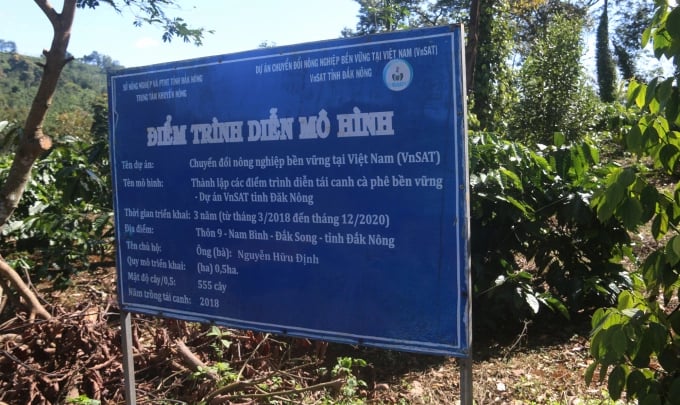
Project VnSAT in Dak Nong has supported thousands of households to effectively replant coffee. Photo: Dang Lam.
According to Mr. Binh, many households in the area saw that their coffee gardens after replanting had developed well and had yielded high productivity, attracting them to join the model.
“Through the exchange of experiences, people grasped the technical process of replanting and converted to a suitable model, helping to stabilize the economy. After grasping the technical process, people have replanted their family's old coffee garden. Currently, most of the old coffee gardens in the cooperative have been replanted, grafted by the members and have yielded more than 4 tons/ha," Mr. Binh added.
Mr. Le Van Thanh (living in Nam Binh commune, Dak Song district) said that his family has more than 4 ha of coffee grown for nearly 20 years, is already old, and has low productivity. Recently, after visiting the coffee replanting models of Project VnSAT, seeing that the trees develop well and give high yields, he also taught himself about replanting his family coffee.
According to Mr. Thanh, when replanting, it took people 3 years without any income to cover their family life. Not to mention, at this stage, people have to spend money on replanting coffee gardens from hoeing, weeding, fertilizing, buying seeds and carrying. From the time of replanting to harvesting, people have to give up hundreds of millions of VND/ha.
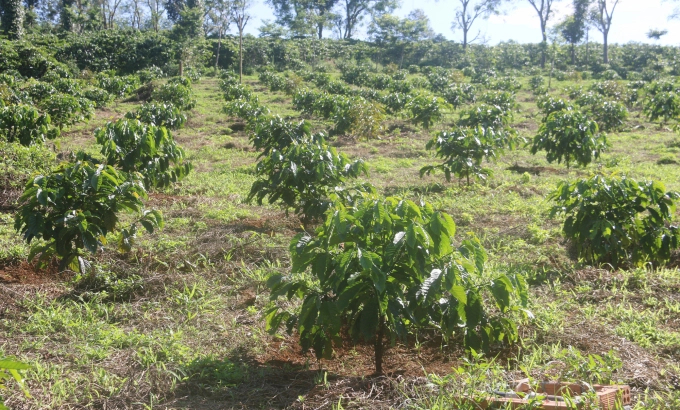
The Project VnSAT helped spread the replanting program outside the project framework. Photo: Dang Lam.
“However, when they knew how to carry out replanting according to a new scientific process, many families voluntarily applied to study and self-financed to replant their old coffee area in accordance with the standards. Replanting according to the program of Project VnSAT requires a lot of time, effort and money, but after all, it is a scientific way to control disease and bring about a high quality, so I am still determined to replant", Mr. Thanh shared.
In order to create favorable conditions for farmers to have funds to replant coffee, Project VnSAT also lends loans to farmers. Mr. Pham Hung Vy, Deputy Director of Project VnSAT in Dak Nong province, said that since coming into operation, the project has lent VND726.88 billion for replanting, equivalent to more than 4,000 ha of coffee supported by the project.
In particular, Project VnSAT also conducted 144 classes with 5,519 trained farmers. Consequently, people in the project area learn the techniques as well as the preparation steps to replant their coffee gardens. To assist farmers to understand the process of properly taking care of their gardens, Project VnSAT also built 110 sites/110 ha of models.
Through the model, the participating households are instructed to cultivate according to the sustainable coffee production process, so the input costs are reduced by 10-15% compared to before the model, the productivity remains stable at 4.2 tons/ha, thereby increasing income and cultivating coffee sustainably, minimizing the impact on the ecological environment.
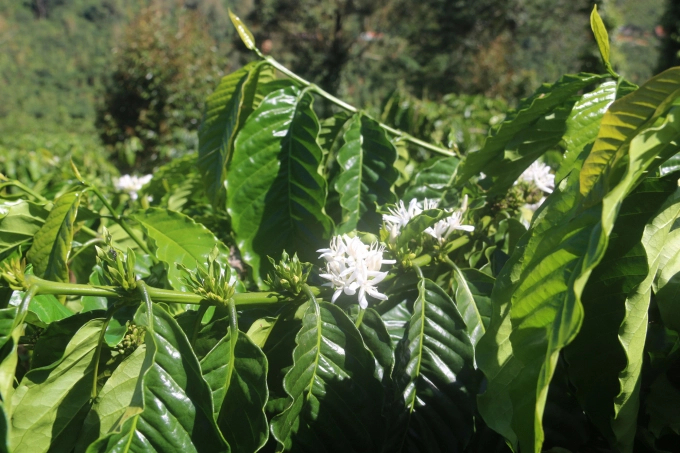
Coffee after re-cultivation gives good income, helping people stabilize their lives. Photo: Minh Quy.
In addition to the area supported by loans, Project VnSAT also helps spread the replanting model to areas outside the project. It is estimated that up to now, people have replanted tens of thousands of ha of coffee during the implementation of Project VnSAT.
“In recent years, Dak Nong has promoted propaganda, mobilized people and businesses to replant coffee trees in a sustainable way in order to gradually replace the area of old coffee trees, pests infested and low productivity with high-quality coffee varieties. With the support of the VnSAT Project, after 5 years of implementing coffee replanting, economic efficiency has been shown and confirmed to be the right direction. The project's coffee replanting program has helped restructure the province's coffee industry," Mr.Pham Hung Vy said.
Translated by Hoang Duy
![Turning wind and rain into action: [8] Real-time salinity detection and early warning technology](https://t.ex-cdn.com/nongnghiepmoitruong.vn/608w/files/news/2025/06/17/z6704423696987_15fd32ffc26d590d204d520c9dac6786-nongnghiep-151127.jpg)
(VAN) Thanks to the integration of modern hydrological-hydraulic models, remote sensing technologies, and artificial intelligence, the accuracy of hydrological forecasting has significantly improved.
![Turning wind and rain into action: [7] Early disaster warnings help marine farmers minimize losses](https://t.ex-cdn.com/nongnghiepmoitruong.vn/608w/files/news/2025/06/17/z6704423696987_15fd32ffc26d590d204d520c9dac6786-nongnghiep-142942.jpg)
(VAN) In recent years, thanks to early disaster warnings and forecasting, marine farmers in Khanh Hoa province have been able to reduce risks and losses, thereby improving production efficiency.
![Turning wind and rain into action: [6] ‘Four on-the-spot’ disaster management software](https://t.ex-cdn.com/nongnghiepmoitruong.vn/608w/files/news/2025/06/17/e5a48259d6a262fc3bb3-nongnghiep-183800.jpg)
(VAN) By simply activating the scenario on the disaster management software, the relevant authorities immediately know how many households need to be evacuated, where to evacuate them to, and by what means of transportation…
![Turning wind and rain into action: [5] Hue applies modern technology in disaster forecasting](https://t.ex-cdn.com/nongnghiepmoitruong.vn/608w/files/news/2025/06/17/z6704423696987_15fd32ffc26d590d204d520c9dac6786-nongnghiep-093938.jpg)
(VAN) In Hue city, modern technology has recently been applied in meteorological and hydrological forecasting and warning, helping to reduce the damage caused by natural disasters.

(VAN) A cutting-edge farming technique being implemented on an experimental ranch in Arizona's Sonoran Desert has already saved a billion gallons of water over five years, according to Civil Eats.

(VAN) Poultry and pig production and the environment can be boosted through enhanced water technology, according to new research.
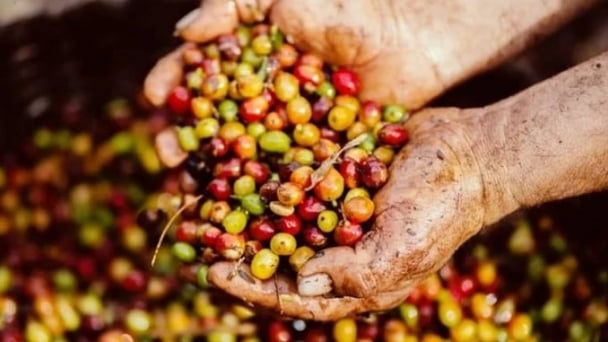
(VAN) Coffee prices on June 16, 2025 are unchanged. In Vietnam, local trading prices are holding steady, ranging around VND 112,000 – VND 112,500/kg.